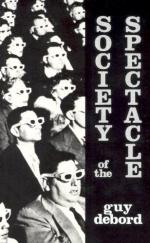
|
| Name: _________________________ | Period: ___________________ |
This test consists of 15 multiple choice questions and 5 short answer questions.
Multiple Choice Questions
1. What was the first ruling class for which labor was a value, according to Chapter 5?
(a) Political kings.
(b) Bourgeoisie.
(c) Ancient Romans.
(d) Royalty.
2. Cyclical time started with what group of people in Chapter 5?
(a) Nomads.
(b) Pilgrims.
(c) Bourgeoisie.
(d) Proletariat.
3. The revolution will restore what in terms of travel and place, according to Chapter 7?
(a) Socialism.
(b) Authentic journey.
(c) Democracy.
(d) Religious control.
4. In thesis 173, who is architecture now being specifically created for?
(a) Governments.
(b) Royalty.
(c) The poor.
(d) The ruling class.
5. What does Deobrd believe culture provides in a society?
(a) Truth.
(b) Freedom.
(c) Illusion.
(d) Meaning.
6. What kind of pseudo-cyclical time is time in the spectacle, according to Chapter 6?
(a) Historic.
(b) Useless.
(c) Valuable.
(d) Consumable.
7. Where was universal history born, according to Chapter 7?
(a) In dark corners.
(b) In cities.
(c) In countries.
(d) In kingdoms.
8. Debord states at the end of Chapter 6 that the world has the ______ of another kind of time.
(a) Power.
(b) Dream.
(c) Will.
(d) Focus.
9. What must be historically manufactured in order to maintain the growth of the modern state bureaucracy in Chapter 7?
(a) Allegiance.
(b) Wisdom.
(c) Apathy.
(d) Faith.
10. What religion does Debord believe is successful at adapting to spectacular society?
(a) Mythology
(b) Buddhism.
(c) Christianity.
(d) Hinduism.
11. What does Debord use as an example of the spectacle in his discussion of life and death in Chapter 6?
(a) Cremations.
(b) Cryogenics.
(c) Life insurance.
(d) Funerals.
12. What is the most important unit in the packaged commodity of time, according to Debord?
(a) Labor.
(b) Production.
(c) History.
(d) Leisure.
13. The religious appeal to God is analogous to the peasant appeal to the ______, according to Chapter 5.
(a) Political power.
(b) Feudal lord.
(c) King.
(d) Guild.
14. What necessity is carefully concealed in the grand style of Debord's era?
(a) Royalty.
(b) Power.
(c) Complacency.
(d) Revolution.
15. According to Debord, urbanization is __________.
(a) Alienation.
(b) Freedom.
(c) Tourism.
(d) Leisure.
Short Answer Questions
1. What is the pilot product of the first stage of commodity abundance, according to Chapter 7?
2. Debord characterizes time in a classless society as being what?
3. Critical theory has to be communicated in the language of __________ in Chapter 8.
4. What seeks to supersede all elements of historic time in Debord's opinion?
5. What does urbanism institute as it destroys the cities in Chapter 7?
|
This section contains 357 words (approx. 2 pages at 300 words per page) |

|




